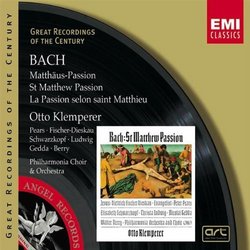| All Artists: Dietrich Fischer-Dieskau, Johann Sebastian Bach, Otto Klemperer, George Malcolm, Viola Tunnard, Philharmonia Orchestra of London, Ralph Downes, Elisabeth Schwarzkopf, Nicolai Gedda, Geraint Evans, Helen Watts, John Carol Case, Otakar Kraus, Peter Pears, Walter Berry, Wilfred Brown Title: Bach: St. Matthew Passion Members Wishing: 0 Total Copies: 0 Label: EMI Classics Original Release Date: 1/1/1960 Re-Release Date: 4/10/2001 Album Type: Box set, Original recording remastered Genre: Classical Styles: Opera & Classical Vocal, Historical Periods, Baroque (c.1600-1750), Modern, 20th, & 21st Century, Sacred & Religious, Symphonies Number of Discs: 3 SwapaCD Credits: 3 UPCs: 724356754225, 724356754256 |
Search - Dietrich Fischer-Dieskau, Johann Sebastian Bach, Otto Klemperer :: Bach: St. Matthew Passion
 | Dietrich Fischer-Dieskau, Johann Sebastian Bach, Otto Klemperer Bach: St. Matthew Passion Genre: Classical
|
Larger Image |
CD DetailsSimilarly Requested CDs
|
CD ReviewsA Sublime Acquired Taste Jonathan Beyrak Lev | Tel Aviv, Israel | 01/21/2005 (5 out of 5 stars) "There's nothing at all humble me can say to the connoisseur about this composition that's not a repetition of a repetition. To the newcomer, though, some words of advice: This is rightly considered one of, if not the best, of Bach's works. To the total newbie, Bach is rightly considered not one, but the best, of western composers. If you read my review you'll probably see why it's not a good idea to start your inquiry into Bach with this particular performance. In fact, I would recommend you start with another work, the St. John Passion, which is what I started with (if you want my advice, take the Koopman version, but I believe I'm in a minority here). Concerning this performance: There's a silly argument going on in the musicological world regarding the "proper" way to perform Bach's music, of which the St. Matthew Passion is a popular object. I was fortunate to have as a teacher of Harmony and Counterpoint one Erez Rapaport, who has greatly impressed me with his hate of theory and his uncompromising demand that every decision, in composition as well as performance, be made based on what sounds best. Arguing about what is the "real" Bach is pointless since the man is long dead. Any criticism on a performance of his work must therefore be based not on whether it conforms to some doctrine or another, but solely on how it sounds. And this one sounds wonderful. Of course, it does take some getting used to, partly because of the slowness, the loudness and the sheer size of the performing forces, but mostly because it just takes a fair amount of time and attention to fully appreciate such an edifice of perfection. Every movement, be it chorus, recitative, arioso, aria or choral is given such minute attention, performed with such incredible skill, and played out to such dramatic extremes that it is simply more than one can take in in a first listening. As opposed to many other lovers of this version, I haven't a word of criticism against the "historically informed" performances (which this performance was considered to be in its time - I wonder what future musicologists will think of the current holders of the title), but a person who cannot enjoy this performance, I am lead to conclude, is more in love with theory than she is with music. Two notes: First, this is an old recording, and therefore it is somewhat lacking. Nothing that interferes with the music, but a background hiss is audible. Second, because of its slowness, this version of Bach's masterpiece is much longer than the others. This, of course, is of secondary importance to artistic merit, but if choosing between two versions of equal merit, doesn't the fact that the pleasure lasts longer make this performance preferable? " Authentic on its own terms Jonathan Beyrak Lev | 12/26/2003 (5 out of 5 stars) "Not sure what purpose is served by using Dr. Klemperer as a stick with which to beat on the historically informed performance crowd. I would no sooner characterize their efforts as heartless than his as like that of a lumbering dinosaur. As to brainwashing, many of my friends who are musicians and academics have both Klemperer and Gardiner's cds on their shelves. While the latter embraces a newly founded scholarly tradition which has reinvigorated the performance of baroque music, Klemperer harkens to the 19th century tradition of Mendelssohn, presenting the Passion as a monumental spectacle. Yes, it is slow and stern, gigantic, glacial and granitic. It also features what may be the best vocal team ever heard in this work. Do take the plunge if you can bear a very slow moving yet very intense experience." A sad sabotage of Klemperer's efforts. Abel | Hong Kong | 03/01/2010 (2 out of 5 stars) "Some claim that this 'slow' version of Bach's majestic "St. Matthew's Passion" is an 'acquired taste'.
While we now tend to have much brisker tempi for barqoue compositions in modern period performances, this version by Otto Klemperer and his fantastic group of soloists is by no means 'obsolete' if... the tempi in all different sections were being kept to the same slow momentum. In the early 19th century revival of JS Bach's works at Liepzig, the approach towards Bach's sacred works was generally grandiose and slower. There is much merit in this, since in a work such as a Passion, nothing meaningful would be served by submitting to quicker tempo. What's the drama? What's the mood? What's the musical purpose? However, as I mentioned, the success of this recording was being smeared by the much brisker narrative sections - the evangelism. Why should the evangelist sing the recitatives in a quicker tempo than the main story is some thing that I could never understand. In my modern religious experience in Passion Sunday liturgy, such 'hurriedness' adds nothing to the solemnity and profoundness of the religious experience of the congregation. As a rule, commentators are forewarned NOT to disrupt the overall mood of the liturgy by drawing excessive attention to himself, or by inappropriately light-hearted commentations. The evangelist here (Peter Pears) did almost just that." |

 Track Listings (31) - Disc #1
Track Listings (31) - Disc #1








